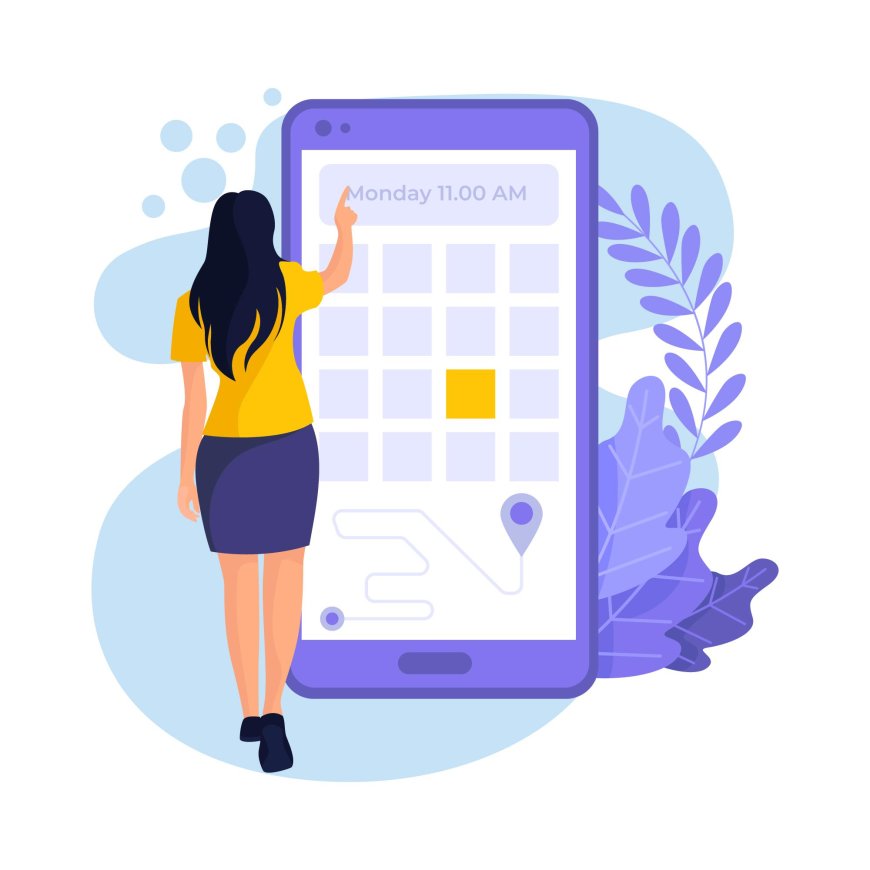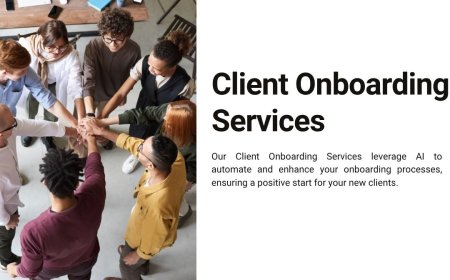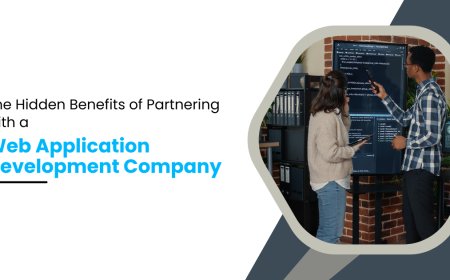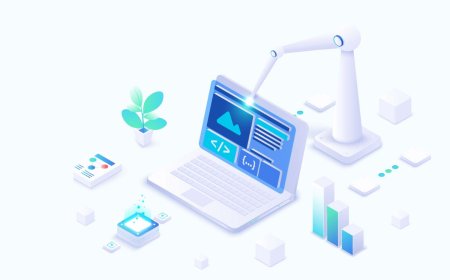The Ultimate Guide to Hiring an App Developer (iOS & Android)
Hiring an app developer is more than filling a position; it’s a strategic decision that influences your entire business journey. That’s why you need a solid hiring roadmap. This guide will walk you through everything you need to know to hire an iOS or Android app developer confidently in 2025.

Introduction
Why Hiring the Right App Developer Matters
In todays tech-driven world, having a great app idea isnt enough; you need the right person (or team) to bring it to life. Whether youre building the next fitness tracker, food delivery platform, or social network, the developer you choose will determine not only how your app looks and works but also how it scales, performs, and earns revenue.
The wrong hire can lead to bugs, delays, extra costs, or worse, a total product failure. The right developer, on the other hand, helps you transform your concept into a polished, user-friendly, and market-ready application.
Hiring an app developer is more than filling a position; its a strategic decision that influences your entire business journey. Thats why you need a solid hiring roadmap. This guide will walk you through everything you need to know to hire an iOS or Android app developer confidently in 2025.
The Booming Demand for iOS and Android Apps
Mobile apps are not just booming, they're dominating. In 2025, the global app economy is projected to generate over $750 billion in revenue, driven by advancements in smartphones, AI integration, and user demand for convenience.
Both iOS and Android platforms have unique user bases and advantages. iOS is known for high-spending users and a premium ecosystem, while Android captures a larger global market share, especially in emerging markets.
This dual dominance creates intense demand for skilled app developers who can build and maintain apps across platforms. Whether youre a startup founder, product manager, or entrepreneur, the time to hire is now, and you need to know how to do it right.
Understanding App Development Basics
Native vs. Cross-Platform Development
Before you hire, you need to decide how your app will be built.
- Native development means building separate apps for iOS (using Swift or Objective-C) and Android (using Kotlin or Java). Native apps offer the best performance, security, and integration with device features.
- Cross-platform development uses tools like Flutter or React Native to build one app that runs on both platforms. Its faster and cheaper, but may have limitations for complex animations or hardware integration.
Knowing your development strategy helps you narrow down your talent search. Some developers specialize in native builds, while others excel at cross-platform frameworks.
iOS vs. Android Whats the Difference?
Each platform has its own development environment, user interface standards, and store requirements.
- iOS Developers use Xcode and program primarily in Swift. iOS devices are uniform, so testing is simpler. App Store guidelines are strict but consistent.
- Android Developers use Android Studio and program in Kotlin or Java. The Android ecosystem includes thousands of devices, which means more testing but greater reach.
Some developers focus on one platform; others can handle both. If you want to launch on both iOS and Android simultaneously, consider hiring a cross-platform expert or a team.
When Should You Hire an App Developer?
Turning an Idea into an MVP
If you have an app idea but no technical skills, hiring a developer early is essential. Theyll help you build an MVP (Minimum Viable Product)a stripped-down version of your app focused on core features.
An MVP is perfect for:
- Testing user interest
- Attracting investors
- Launching faster with fewer risks
Bringing in a developer at this stage ensures your product is built right from day one.
Scaling an Existing App or Business
Already have an app or working prototype? If youre hitting growth barriers or technical debt, its time to bring in a more experienced developer or team.
They can help with:
- Performance optimization
- Feature expansion
- Bug fixes and security patches
- Backend scaling and architecture upgrades
Experienced developers know how to scale apps safely and efficiently.
Needing Specialized Features or Skills
Some apps require skills beyond basic development:
- AI/ML integration
- Blockchain transactions
- Advanced animations or AR
- Complex third-party APIs
In such cases, generalists wont cut it. Youll need a specialist with a proven track record in that niche.
Types of App Developers Available
Freelancers
Freelancers are independent developers you can hire for short-term or one-off projects. Theyre typically more affordable and flexible than full-time staff or agencies.
Pros:
- Budget-friendly hourly or fixed rates
- Wide global talent pool
- Fast hiring and onboarding
Cons:
- Limited availability for future work
- May lack full-stack capabilities
- Requires more management and oversight
Freelancers are great for MVPs, bug fixes, or smaller projectsespecially when speed and budget matter.
Agencies
App development agencies offer end-to-end servicesfrom concept to deployment. They often include designers, developers, project managers, and testers.
Pros:
- Professional, organized development process
- Clear contracts and timelines
- Design, backend, and QA support included
Cons:
- More expensive than freelancers
- Less flexibility with scope changes
- May assign junior developers despite senior quotes
Agencies are ideal for businesses looking for a turnkey solution without managing individual developers.
In-House Developers
Hiring full-time in-house developers makes sense if your app is core to your business, and you plan long-term scaling and maintenance.
Pros:
- Full control and real-time collaboration
- Deep product understanding over time
- Easier integration with internal systems and teams
Cons:
- High ongoing costs (salary, benefits, workspace)
- The hiring process is slower and more competitive
- Commitment is long-term
If your app is your business, building an in-house team can offer the best ROI in the long run.
Offshore Development Teams
Offshore teams are companies or groups located in cost-effective regions (e.g., Eastern Europe, India, Southeast Asia) that offer skilled developers at lower rates.
Pros:
- Lower cost for high-quality work
- Full-stack capabilities across time zones
- Scalable resources on demand
Cons:
- Time zone differences may hinder real-time updates
- Communication barriers (language/cultural)
- Need for strong project management
For cost-effective, scalable developmentespecially for MVPs or startupsoffshore teams are a smart choice.
How to Define Your App Requirements Clearly
Define Your Apps Core Features
Before hiring, you must clearly outline what your app needs to do.
Ask yourself:
- What problem does the app solve?
- What are the must-have features vs. nice-to-haves?
- What platforms does it need to support?
Example core features:
- User login and profiles
- Push notifications
- Geolocation
- In-app payments
- Admin panel for management
A clear list ensures the developer knows exactly what to buildand how long it may take.
Create a Feature Roadmap
Your app doesnt need to be complete at launch. Instead, define a feature roadmapa timeline showing what youll build now and what youll add later.
Break it down like this:
- Phase 1: MVP with core features (login, product browsing, checkout)
- Phase 2: User reviews, referral systems, social sharing
- Phase 3: Loyalty program, AI recommendations, analytics dashboard
This roadmap helps you stay lean, launch faster, and save money while still planning for long-term success.
Understand User Personas and Flows
Developers build better apps when they understand who the users are and how theyll interact with their product.
Define:
- Primary users (age, job, goals, pain points)
- User journey (signup ? browse ? purchase ? support)
- UX priorities (speed, accessibility, personalization)
Documenting this helps developers optimize UX, prioritize features, and design intuitive flows.
Skills to Look For in an App Developer
Technical Skills (iOS, Android, APIs)
Your developer should be proficient in:
- iOS: Swift, Objective-C, Xcode
- Android: Kotlin, Java, Android Studio
- Cross-platform: Flutter, React Native
- APIs & integrations: RESTful APIs, Firebase, third-party SDKs
Bonus: Database experience (MySQL, MongoDB), backend (Node.js, Django), or DevOps knowledge (Docker, AWS).
UX/UI Design Understanding
Even if you have a designer, your developer should understand:
- Mobile UI principles (touch targets, gestures)
- Adaptive layouts for different screen sizes
- App store design guidelines
Developers who understand UX produce cleaner, more usable apps and reduce design-developer friction.
Problem-Solving and Communication
Coding is only part of the job. A great app developer is:
- Proactive in finding bugs
- Adaptable when problems arise
- Communicative about timelines, delays, or suggestions
Ask how theyve handled bugs or missed deadlines in the past to gauge their professionalism.
Portfolio and Project Experience
Always review past work:
- Do they have live apps in the App Store or Google Play?
- Have they worked on similar features to your app?
- Are there reviews or client testimonials?
The best predictor of success is proof of past success.
Where to Find App Developers
Freelance Platforms (Upwork, Toptal, Fiverr)
Great for short-term or MVP work. Platforms offer reviews, portfolios, and payment protection.
- Upwork: General and specialized talent
- Toptal: Vetted elite freelancers
- Fiverr Pro: Curated professionals for niche needs
Developer Marketplaces and Agencies
- Clutch and GoodFirms: Agency directories with reviews and cost estimates
- Gigster: Managed freelance teams
- YouTeam: On-demand remote engineers
These platforms are best for scaling or full-project outsourcing.
Tech Forums and GitHub
Engage directly with developers who contribute to open-source or participate in forums:
- GitHub: Explore project contributions
- Stack Overflow: Find experts answering niche dev questions
- Reddit (r/forhire): Post job listings or project details
Great for networking or finding passionate developers outside mainstream platforms.
Referrals and Networking Events
Never underestimate the power of word-of-mouth. Ask other founders, attend startup meetups, hackathons, or join online communities like Indie Hackers or Product Hunt to find trusted talent.
Referrals and Networking Events
Referrals are often the most reliable way to find top-notch developers. When someone vouches for a developer they've already worked with, it reduces your hiring risk significantly.
Where to get referrals:
- Fellow startup founders
- Business accelerators or incubators
- Product managers and CTOs in your network
Additionally, attend:
- Tech meetups and conferences
- Startup weekends
- Online webinars and networking events on platforms like Meetup, Eventbrite, or LinkedIn
Many successful app development hires come from a simple introduction made at a local event or via a Slack group.
How Much Does It Cost to Hire an App Developer?
Hourly and Project-Based Rates
Hiring models vary, but heres what you can expect in 2025:
- Freelancers:
- Junior: $15$40/hour
- Mid-Level: $40$80/hour
- Senior: $80$150/hour+
- Agencies:
- Small projects: $5,000$25,000
- Mid-size apps: $25,000$80,000
- Complex platforms: $100,000+
- Full-time in-house developers (Annual):
- Junior: $60,000$85,000
- Mid-Level: $85,000$120,000
- Senior: $120,000$180,000+
Regional Differences in Developer Costs
Developer rates differ globally:
Region Hourly Rate (Avg)
North America $80$150+
Western Europe $70$120
Eastern Europe $30$70
India & Southeast Asia $15$50
Latin America $25$60
Outsourcing to places like Eastern Europe or Asia can reduce costs without sacrificing quality, if vetted properly.
Cost by App Complexity
The more complex your app, the higher the cost.
App TypeEstimated Cost
Basic Utility App $5,000$15,000
Social or Messaging App $30,000$80,000
Marketplace or E-Commerce $40,000$100,000+
On-Demand Service App $50,000$150,000+
Enterprise Custom App $100,000$500,000+
Plan your budget based on your feature list, timeline, and business goals.
Interview Questions to Ask Before Hiring
Technical and Skill-Based Questions
- Which languages and frameworks are you most experienced with?
- Have you published apps on the App Store or Google Play?
- How do you handle version control and code review?
- How do you manage third-party integrations and APIs?
Always ask to see a portfolio or live apps they've built.
Communication and Collaboration Style
- How do you prefer to communicate: Slack, email, or Zoom?
- Are you available in my time zone?
- Do you give regular updates or progress reports?
Clear communication ensures deadlines are met and bugs dont pile up.
Testing Problem-Solving in Real Time
Give a live problem or a small task:
- A logic challenge or feature to the pseudocode
- A real-world bug to debug on-screen
- A UI mockup to implement quickly
This helps assess the thinking process, skill level, and coding discipline under pressure.
Red Flags to Watch Out For
Overpromising Without Understanding Scope
Be cautious if a developer says:
- We can build that in 2 weeks (without details)
- Yes to everything without asking clarifying questions
Good developers ask questions before making promises.
Lack of Documentation or Code Ownership
Always confirm:
- Youll get full access to the code repo (GitHub, Bitbucket)
- Theyll document APIs and app structure
- The code is modular and transferable
Otherwise, youll be locked into a mess no one else can manage later.
Poor Communication or Missed Deadlines
Red flags:
- Ghosting for days
- Excuses without accountability
- No project timeline or deliverables
Its better to cut ties early than let a disorganized dev tank your timeline.
Best Practices for Working with an App Developer
Using Agile or SCRUM for Progress
Agile development keeps your app evolving through:
- Weekly sprints
- Sprint planning and reviews
- Backlogs and task tracking (e.g., Jira, Trello)
This structure ensures transparency and progress tracking.
Setting Clear Milestones and Deliverables
Break down work into phases:
- MVP launch date
- Design delivery deadline
- API integration week
- Testing and bug-fix schedule
Tie payments to milestones for accountability.
Tools for Collaboration and Project Management
Use these tools to stay on the same page:
- Slack/Discord: Real-time communication
- Trello/Jira/ClickUp: Task management
- GitHub/GitLab: Code versioning
- Figma/InVision: Design collaboration
- Google Drive: Contracts, docs, backups
Clear organization = smoother development.
Post-Hiring Steps
Setting Up NDAs and Contracts
Protect your IP by:
- Signing NDAs before sharing details
- Defining ownership of all code, design, and data
- Including timelines, payment terms, and penalties
Use legal templates or consult an IP attorney.
Granting Access to Dev Tools and Resources
Once hired:
- Share Git access, design files, and backend APIs
- Create developer accounts (Apple, Google)
- Onboard them with your Slack or workspace tools
Smooth onboarding = faster productivity.
Planning for Maintenance and Updates
After launch, apps need:
- OS updates (iOS, Android)
- Bug fixes
- Feature enhancements
- Performance optimizations
Schedule check-ins or create a retainer plan to keep your app updated and competitive.
Conclusion
Hiring an app developer, whether for iOS, Android, or both, is one of the most strategic decisions youll make as a founder or business leader. The right developer can turn your idea into a polished, successful product. The wrong one? Costly delays and frustration.
Define your goals. Know your budget. Vet carefully. Communicate clearly. And above all, hire for long-term compatibility, not just short-term availability.
When done right, hiring a great developer isn't just an expense; its an investment in your business future.
FAQs
How long does it take to hire an app developer?
It can take anywhere from 1 to 4 weeks, depending on the platform, availability, and your selection criteria. Fast-track hiring with pre-vetted platforms like Toptal or referrals.
Whats the best platform to hire app developers?
For freelancers: Upwork, Toptal, Fiverr Pro
For agencies: Clutch, GoodFirms
For networking: GitHub, LinkedIn, Reddit (r/forhire)
Do I need separate developers for iOS and Android?
Not necessarily. You can hire a cross-platform developer (Flutter, React Native) to build for both platforms with a single codebase.
Whats the ideal budget for hiring a mobile app developer?
For an MVP, expect $10,000$30,000. For a full-featured app, budget $50,000$150,000+ depending on scope and region.
Can I hire an app developer without a tech background?
Absolutely. Many non-technical founders hire developers. Just ensure you have clear documentation, project scope, and use tools for collaboration and updates.








































